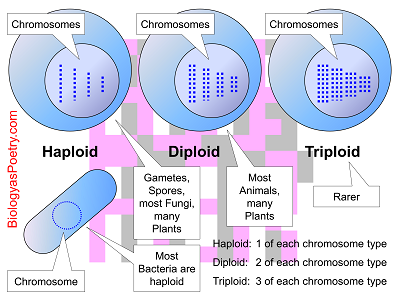∞ generated and posted on 2016.08.28 ∞
Having two not necessarily identical copies of every gene.
This actually means having two copies of every type of chromosome such as one copy from Mom and one copy from Dad. The exception, in diploid organisms, can be the sex chromosomes, where the X and Y chromosomes actually are not very similar whereas the other chromosomes, coming from Mom versus Dad, instead are quite similar in terms of size as well as nucleotide sequence (these other chromosomes, contrasting the sex chromosomes, are called autosomes).

Figure legend: Ploidy refers to numbers of sets of chromosomes that a cell or organism possesses. Haploid refers to a single set. Diploid refers to two sets, such as one set obtained from Mom and a second obtained for Dad. It is possible for ploidy to be higher than this, such as triploid or tetraploid, collectively referred to a polyploid, though this is much rarer than diploid versus haploid.
Other organisms, such as bacteria, instead are haploid, having only one copy of most genes.